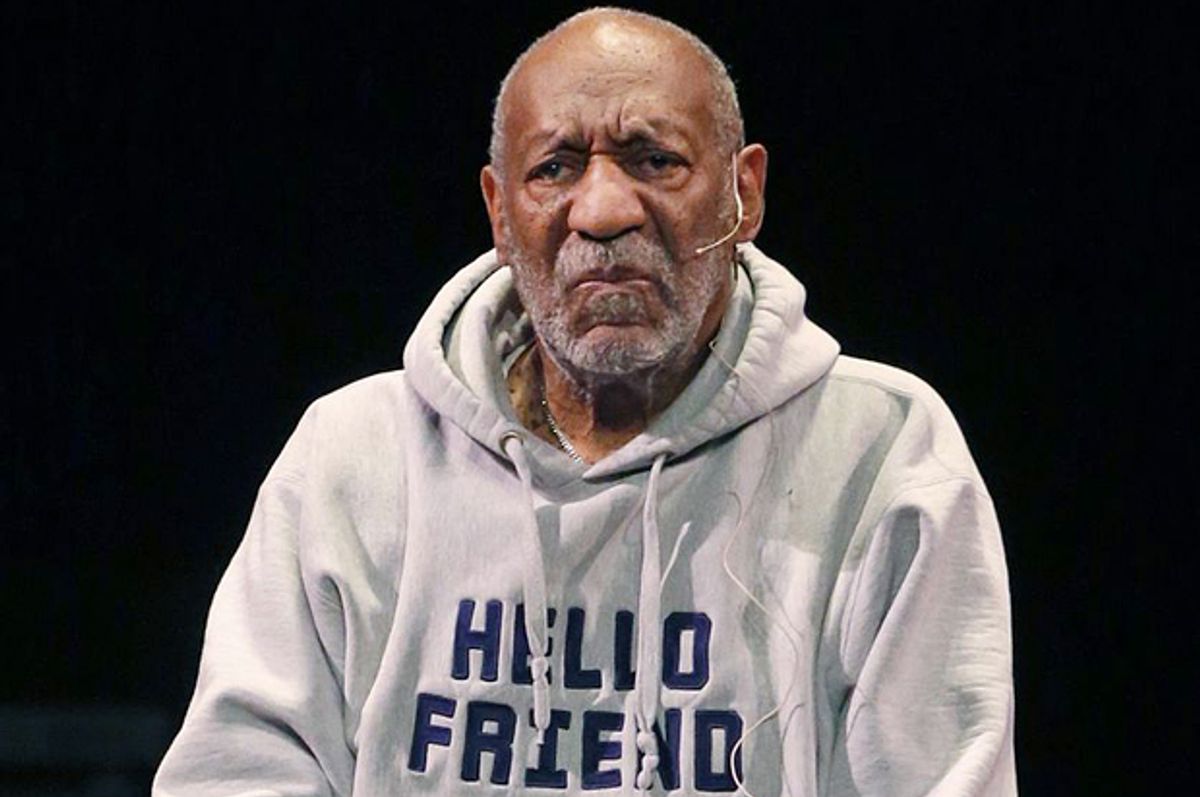On Monday, former film executive Cindra Ladd published an essay for the Huffington Post detailing her experience of being drugged and raped by Bill Cosby in 1969. When I saw the piece, I thought for a while about posting a news item, but I didn’t even know what it would say. What is there to say about Ladd’s story that hasn’t been said already about the 20-plus other stories of Cosby's alleged sexual abuses? How many times can we write the same news item, only to have more women come forward?
Of course, this isn’t “the same” news item, because none of these women’s stories are quite the same; they are separate accounts of one man violating individual women. To lump all their stories together as if they’re one and the same cruelly mitigates each woman’s pain, as well as her strength. Ladd claims she was 21 when she met Cosby, who was already married to his wife, Camille. She says they spent time together watching television and eating pizza, until one night he offered her a pill for a headache and everything quickly changed:
For more than 45 years I have tried to recall exactly what happened that night. To this day it remains a blur. I have a vague recollection of feeling like I was floating while walking through Times Square and watching some kind of Japanese samurai movie with him. I don't remember where the theater was nor very much of the evening.
What I do recall, vividly and clearly, is waking up the next morning nude in the bed of his friend's apartment and seeing Cosby wearing a white terrycloth bathrobe and acting as if there was nothing unusual. It was obvious to me that he had had sex with me. I was horrified, embarrassed and ashamed. There was a mirror above the bed, which shocked me further.
This is Ladd’s story — it is similar to, but not the same as, all the other alleged victims' stories. But there’s no way around the fact that the larger narrative is the same, and it goes a little something like this: Bill Cosby is allegedly a serial predator who repeatedly used his charm and fame to entice young, vulnerable women before drugging them against their will and raping them — or attempting to rape them — while they were not fully conscious.
So what does it matter, really, that Ladd has come forward and tell her story? Could it possibly be different in any crucial way? At this point, with yet another public disclosure of alleged rape, the nonbelievers aren’t quite going to be convinced. To take from Larry Wilmore’s deft analysis last week, "the current tally stands at 35 women — really folks, how many more women do we need?"
Ladd’s story isn’t going to be a game-changer in the Cosby case, and yet it’s vitally important that she told it. The way she shared her account matters, too. At one point, Ladd offers a disclaimer to explain why she’s decided to come forward after keeping the allegations mostly to herself for decades: “This is the first time I have chosen to speak out about that night. It is also the last time I intend to address it publicly. I have no plans to sue, I don't want or need money. I have no plans for a press conference or for doing any interviews." She also feels the need to note that while she might have been promiscuous in her youth, her alleged encounter with Cosby was not consensual — a defense against naysayers that shouldn’t be necessary when a woman shares her story of being violated, least of all when dozens and dozens of women have preceded her in contributing to this particular narrative.
And yet. And yet, it is still vitally important that women such as Ladd come forward and tell their stories, because men such as Cosby are still performing for crowds of 1,800 and receiving standing ovations. It’s no longer about Cosby or the allegations against him, but about women having the space to tell their stories and about forcing ourselves to listen. But with or without the disclaimers that make these women so-called perfect victims, each of these accounts is invaluable. Former reality TV star Janice Dickinson, for example, is no more at fault for her alleged assault than Ladd, who so clearly felt the need to illustrate that she isn't seeking to advance her career or her fortune on the back of her story, negating two common arguments used to discredit women who accuse wealthy and powerful men of abuse. Is this really still something we need to be told? That rape victims don’t come forward because they’re looking for acclaim?
The end game here doesn’t involve fame or money or, really, Bill Cosby. There might not be quantifiable justice for his numerous alleged victims — at this point, what would that even look like? Ladd’s story doesn’t open up the limited possibility of prosecuting Cosby within the statute of limitations for sexual assault. It won’t tarnish his ruined legacy any more. It’s unlikely to prompt a breakdown from this stoic fallen icon, in which he publicly fesses up to the accusations. And if it did, how would we even respond?
We are still learning how to respond to women’s stories, and therein lies the benefit of Ladd’s essay. She has given us one more tool for seeking justice for future victims, and for reconceptualizing what we make of powerful men. But that should not be because she has said or done the "right" things, because she herself is in a position of power; a woman’s unassailability shouldn’t matter, not when she’s the first to come forward and not when so many others came before her. Her story matters, period. One would hope that doesn’t bear repeating so very many times — but that’s really all there is to say.



Shares